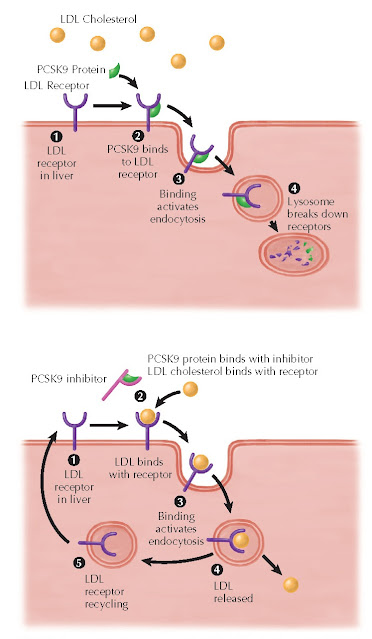GENETICS IN PHARMACOLOGY
The genetic role in cardiovascular diseases has been essential, especially in the field of pharmacology. The identification of genetic and epigenetic associations with diseases has led to the development of medications in the prevention and treatment of cardiovascular diseases. An important and novel example is the development of a class of medications called proprotein convertase subtilisin/kexin type 9 (PCSK9) inhibitors.
 |
| FIG 3.3 Proprotein Convertase Subtilisin/Kexin Type 9 (PCSK9). |
The binding of circulating low-density
lipoprotein (LDL) cholesterol to LDL receptors, predominantly found in the
liver, activates endocytosis of both the receptor and LDL cholesterol, with a
resulting decrease in plasma LDL levels. PCSK9 is a protein that binds to LDL
receptors and leads to the degradation of LDL receptors (Fig.
3.3). An important early finding was based on genetic analysis of French
families with autosomal familial hypercholesterolemia. That study, and many
since, have identified mutations that resulted in a gain of function to PCSK9,
which led to elevated LDL levels in plasma. Two missense mutations that led to
a loss of function of PCSK9 were found in a group of African Americans, which
resulted in lower LDL levels. Based on these and more mechanistic studies, drug
development to inhibit PCSK9 began. Currently, two novel monoclonal antibodies,
evolocumab and alirocumab, are approved for use in humans with resistant
hypercholesterolemia to lower LDL levels. Genetics have also been used to evaluate
individual response to medications currently in use. A common example is for
dose adjustment of a common blood thinner, warfarin, a vitamin K antagonist
used for a number of disease entities, such as prevention of strokes in atrial
fibrillation and treatment of venous thromboembolism. Warfarin has a narrow
therapeutic window, measured by the international normalized ratio.
Polymorphisms in two alleles, CYP2C9 and VKORC1, have been studied in
initiating, escalating, and maintenance doses of warfarin. Clinical data have
shown a correlation of maintenance doses for warfarin with various genetic
polymorphisms of the preceding alleles; however, routine clinical use continues
to be of questionable importance. It is reasonable to anticipate that
pharmacogenetic studies will lead to more
precise use and dosage of a variety of cardiovascular drugs.




